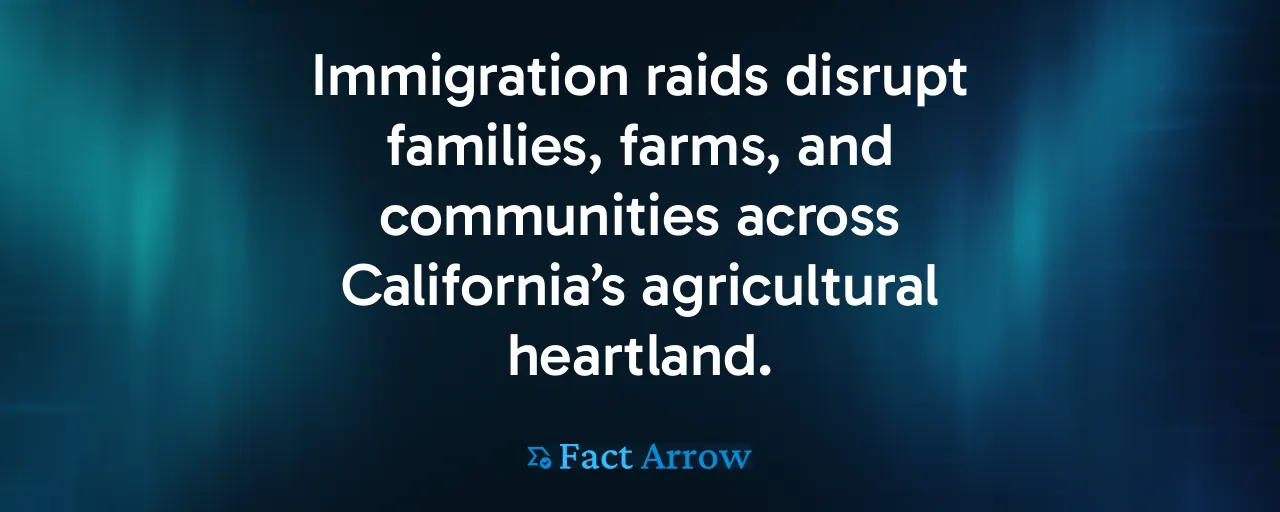Fear Grips the Inland Empire
In California's Inland Empire, federal immigration raids have torn through rural communities, leaving families in hiding and farms in chaos. On June 18, 2025, Jennifer Siebel Newsom, California's First Partner, visited Perris to meet with those affected. She heard gut-wrenching stories at TODEC, a nonprofit lifeline for immigrant families: grandmothers too scared to shop, children missing school, and breadwinners lost to despair. These raids, ordered by the Trump Administration, target undocumented workers but ripple far beyond, shaking the core of California's agricultural heartland.
The human toll is staggering. Farmworkers, who harvest the crops feeding millions, now face indiscriminate sweeps by ICE. TODEC's 24/7 crisis hotline buzzes with calls from mixed-status families, legal residents, and even citizens gripped by fear. This situation represents a humanitarian crisis unfolding in real time, with real people caught in the crossfire.
A Blow to California's Economy
California's farms, the backbone of a $50-billion agricultural economy, rely on immigrant labor. University studies warn that mass deportations could slash the state's GDP by $275 billion and strip away $23 billion in annual tax revenue. Farmers report up to 70 percent absenteeism after raids, with crops rotting in fields. The ripple effect hits consumers nationwide, as food prices climb and supply chains falter.
Small, BIPOC-owned farms, which supply healthy meals to schools through California's Farm to School program, face the brunt. These growers, championed by state leaders, can't afford labor shortages. The Universal Meals program, feeding nearly half the state's students, hangs in the balance when workers vanish. Federal enforcement disrupts lives and threatens the systems that nourish communities.
Trauma's Lasting Echoes
The mental health toll on families is profound. Public-health research links raid zones to soaring anxiety, depression, and even worse birth outcomes. Children, especially in mixed-status households, skip school during sweeps, their futures clouded by fear. Reports of suicides among detained or jobless parents underscore the crisis's depth. TODEC's mental health services and California's Youth Behavioral Health Initiative, offering free resources like BrightLife Kids, try to bridge the gap, but demand outstrips supply.
Access remains a hurdle. Language barriers and distrust of institutions keep some families from seeking help. Advocates argue that trauma from militarized enforcement erodes community trust, making it harder for police, schools, or clinics to serve those in need. The state's investment in youth well-being, while historic, faces strain under the weight of federal policies.
Roots of Resilience
For decades, California has wrestled with federal immigration enforcement. The 1986 Immigration Reform and Control Act offered amnesty but tightened employer rules, setting the stage for today's tensions. When raids surged in the early 2000s, the state pushed back, culminating in the 2018 sanctuary law limiting ICE cooperation. Today, Governor Newsom's administration funds legal defense and crisis hotlines, while TODEC organizes communities to advocate for change.
TODEC's work reflects a broader vision: families contributing to society deserve stability, not fear. Since the Reagan era, the organization has backed commonsense reforms, like legal pathways for workers who've long called California home. This resilience, rooted in community organizing, offers a counterpoint to enforcement's chaos.
A Vision for Humanity
Advocates call for federal reforms that honor human dignity. A pathway to citizenship for long-term residents, especially farmworkers, tops the list. Expanding DACA and humanitarian parole could protect vulnerable families. State-funded legal aid, like TODEC's services, empowers communities to fight deportations. Strengthening sanctuary policies ensures local agencies prioritize public safety over federal sweeps.
Investing in mental health and ethical food systems is equally urgent. Programs like Universal Meals, sourcing from local farms, show how policy can uplift workers and kids alike. California's model proves that supporting immigrants strengthens everyone, from growers to students to consumers.
Bridging the Divide
Common ground exists, even in polarized times. Both sides see value in modernizing agricultural visas to ensure legal, temporary workers while protecting local economies. Focusing enforcement on serious offenders rather than families or laborers gains traction across party lines. Mental health services for kids affected by raids draw broad sympathy, especially when delivered through schools.
The path forward lies in balancing humanity with pragmatism. California's experience shows that investing in people, from legal aid to school meals, builds stronger communities. Federal policies that tear families apart or destabilize food systems serve no one.
A Call to Act
The raids in California's fields expose a broken system. Families live in fear, farms falter, and children bear scars that could last a lifetime. Yet, the response from advocates, farmers, and state leaders points to a better way: policies that prioritize people and their well-being.
Supporting organizations like TODEC, expanding mental health access, and pushing for federal reform are steps toward justice. California's programs, from Farm to School to youth counseling, show what's possible when communities rally. The nation's food supply, and its moral compass, depend on getting this right.
Every day without reform deepens the crisis. It is time to prioritize compassion and unity. The stories from Perris demand nothing less.
